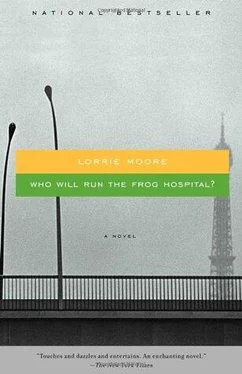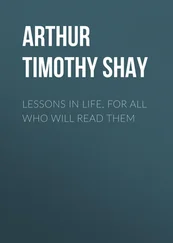“Well, you’re fighting the good fight,” I say.
“I’m crying the good cry.” He sighs.
“You’re doing fine.”
I teach him a version of honeymoon bridge, the same version Sils and I used to occupy ourselves with. We don’t keep score, but we each try to win. When he gets a bad hand, he falls forward, sighing, “This hand is a foot!” a line from some dissolute uncle of his. That — along with our Chez Stadium, mais oui/ may we jokes, and Pépé LePew imitations — somehow keeps us amused, a brief contentment; it is a respite from out petty quarrels and brittle looks, arguing, as tourists do, about where we’re going, where we are, the questions no longer just metaphorical but literal, replete with angry pointing and some disgusted grabbing of maps, right out of the other’s hands.
By Wednesday morning Daniel decides to go to a gymnase club before his meeting. He’s up promptly, with the throaty rumble of the pigeons, the sky-whitening sun, the garbage trucks trolling along the curbs, and the Siamese cat on the roof of the neighboring building, the slight honk of baby in its cry, scratching at a window to be let in. Daniel’s grown restless and irritable. “This would be a great town,” he says at breakfast over café crème , “if only everyone spoke Spanish.” His voice is full of rue. “Also, why does everyone in the whole city have to touch the bread? You go to buy bread, and the baker touches it, the cashier touches it, the assistant hands it over to you, then finally you yourself just tuck it under your armpit and go out and bump into other people on the street with it. How can we have a medical conference in a town with such unsanitary bread?”
This is not simple, joky Ugly Americana. This is Daniel’s way. It is like at home when he complains about emptying the dishwasher: “This is not a time-saving device. Why has no one invented something that will just wash these things right in the cupboard?” It is his habit to locate all the lapses and betrayals of the modern world. Yet it is also his habit to want to believe what he reads. He heads for places with signs that say On parle anglais ici . “But On is never there. Have you ever noticed that?”
“You’re doing fine here,” I say. “Think of it this way: the French love Jerry Lewis. They probably adore you.” The world in italics. “Think of this as a kind of Doctors in Paris thing. A musical.” But even the italics, it seems, are losing their italics: standing tall, passing themselves off as literal and real. Straight shooters.
He gives me a look, then turns. “I like the weather,” he adds enthusiastically. “You need a jacket, but you don’t have to zip it!” Then he adds darkly, “It’s that Deportation Monument. That tells you who the Parisians really are.” The Deportation Memorial, in the shadow of Notre-Dame, is something we stumbled upon two days before and it left us dumbstruck. “And another thing: have you ever noticed what the supreme Parisian compliment is? ‘Oh, you speak French so well, without any accent !’ ”
“It’s horrible,” I agree. “It’s rude.”
“It’s more than rude,” he says. “It’s genocidal.” And he is right, I think. He is right.
With my middling French and leather jacket — unzipped! — trying to seem residential, I go with him to the gym, to get him settled there. We pay the money and I ask the woman at the desk if there is anything else, any rule or requirement. She smiles. She looks at Daniel. “The only requirements is that you be happy man,” she says. She is tan from sunlamps and is wearing an orange leotard.
“Bye,” I say to him. “Au revoir.” I leave to make my way alone along the ankle-twisting stones of the smaller crowded streets, my leather jacket squeaking like a chair. Perhaps I should go shopping — a married person’s version of dating. Perhaps I should ditch the jacket and float around in the museums like a sylph, or a balloon.
People bump into me, and I say “Whoops” or “Wope”—not words that translate into any Parisian comprehension, though they’re the first sounds to my lips. Almost always. With everything.
I go slow, with my hip.
Passing cafés and restaurants, I walk through the bright glance of men in love, who, looking briefly away from the lover across from them in order to more perfectly form a sentence, unwittingly cast their gaze across my path like a light. And so, momentarily, to have accidentally caught their desire, swimming across the current of it like that, passing through, I feel loved, in a warm and random way, wandering through it, as if it were a rainbow, that old trick of light, or a place in a pool where someone has peed. There is a sweet, silent rot to it.
Otherwise, it is hard, galumphing along through a sea of Frenchwomen who have exquisite shoes and haircuts, overbites unruined by orthodontia, faces unbedecked by optometry, a great, nearsighted, chomping faith in their own beauty that makes them perhaps seem prettier than they are. It is hard to find a place for yourself in a city like this.
The trees are like candelabra. The pastries like art.
There is a smell one begins to exude here: something old-mannish and acrid, like our cabbie coming in, something to do with the food, the wines and chèvres . My body fights travel, sends up the weapons of a homeless person, the boundaries thinly drawn, the body with its own knowledge, disorientations, defenses: the winy sweat, the cheesy shit. It takes me walking, then sits me down again, over and over, its own rhythms and wants.
My hip still aches from my fall last December, the cracked bone moody and susceptible to weather, but if I need to I limp. Perhaps somewhere I’ll just stand against a wall and ask for coins.
“Paris,” I hear a passing tourist remark. “It’s one big StairMaster.”
There is an Audrey Hepburn festival at one of the revival theaters on the Left Bank, and everywhere I see posters for it: Hepburn’s wide eyes and mouth. “Have you ever noticed,” Daniel has said, “that she looks like Anne Frank?” Now I feel as if I’m seeing pictures of Anne Frank all over town: Anne Frank in a black turtleneck. Anne Frank in an evening gown. The essence of Paris, Daniel might say, there you go: Anne Frank in an evening gown.
The italics are losing their italics.
The flower beds are full of pansies whose triangular, black centers boast the mustache of Hitler himself.
I stop at pâtisseries and get the pastries with funny names: Divorce, Religieuse, Gland. I like the Divorce ones — half coffee, half chocolate — and I sit in the Luxembourg Gardens, eating my various Divorces, watching the children throw things into the pond. Planted in large, gorgeous ovals are tulips so big they look as if they’d steal your jewelry. There are school groups here on tour, the girls giddy and tired and falling into one another’s laps, playing with one another’s hair. The boys stand around looking exiled and sad.
I get up and walk some more, back across the river: the views of the city up and down dazzle and console. Near the Louvre, which is being cleaned, always being cleaned, two angels and some cherubs have been removed, set in locked crates at the edge of the Tuileries and one can walk by and look at them through the slats, see them regally sitting there, a zoo of pagan saints, their winged and caged condition like the aftermath of some palace revolt in Heaven. Aw , I find myself thinking. Aw .
A lot like Whoops. Wope. Whoops-a-daisy .
I go into the Louvre, but I don’t stay long. It’s too different now. I’ve lived long enough to see the great museums change: their annexes and entrances, the location and arrangement of the art. My own memory, from a trip ten years ago, is a tired, old coin. Who will house that? Who will house the Museum of Museums, in order to show us how museums once were?
Читать дальше












